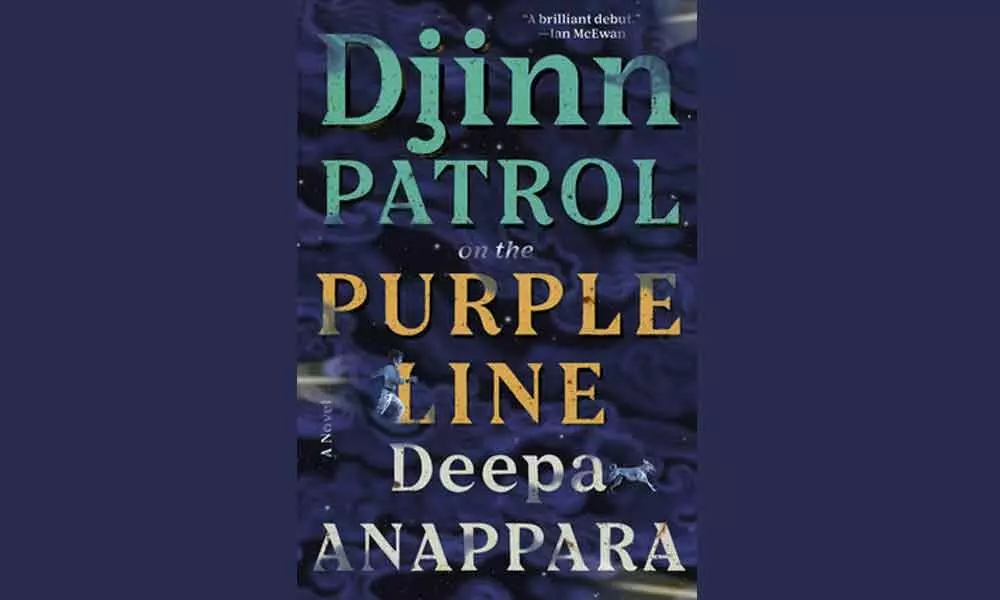The case of the missing children

A nine-year old amateur detective and his young team try to solve the mystery of children going missing from their sprawling basti in Deepa Anappara's debut book, "Djinn Patrol on the Purple Line"
A nine-year old amateur detective and his young team try to solve the mystery of children going missing from their sprawling basti in Deepa Anappara's debut book, "Djinn Patrol on the Purple Line"
Deepa Anappara's debut book has an engrossing story seen through the eyes of Jai, the young protagonist that focuses on the disappearance of young children in India. Anappara is an engaging writer, her language is coloured with vivid imagery, and she uses banter and humour to leaven the darkness of the subject and its setting.
She intertwines the ghastly crimes with tales of 'bhoots' (ghosts) and supernatural happenings, involving a female ghost who protects young girls from assault and a decrepit palace haunted by djinns who act as healers. Jai clings to the belief that the missing children have been abducted by a djinn because to accept the option is too horrific to think of.
A former journalist, Anappara won much acclaim for her debut novel, winning several prestigious work-in-progress awards for her early chapters. The debut book was published internationally in early February, hailed as the best find of the year and backed with laudatory endorsements by world renowned writers like Anne Enright and Ian McEwan.
According to Anappara, as many as 180 children go missing every day in India. Having worked as a journalist in Delhi and Mumbai, she is familiar with the conditions in Indian slums. She writes: "The idea for this novel was sparked by my anger and disappointment at a system that had failed the very people it was supposed to protect."
Her story brings in shades of the Nithari killings in Noida, where children from the basti went missing while local police brushed aside complaints, labelling the children as runaways.
The infamous Nithari crimes came to light in 2006 after a number of children and young women disappeared from the Nithari urban village in Noida. Faced with police inaction, villagers filed cases in court. A court appointed investigation led to the arrest of the owner of a bungalow and his domestic servant after body parts wrapped in plastic bags were found in a drain adjoining the house.
Jai lives in a one-roomed makeshift hut with a corrugated metal sheet for a roof with his parents and elder sister, Runu didi. Addicted to crime shows on television like "Crime Patrol", he decides to investigate the crime when a school friend goes missing. He takes the help of two friends, the bright and clever Pari and not so enthusiastic, Faiz.
Their basti lies next to a towering block of luxury apartments where 'hi-fi' people live and where their mothers go to work as maids and nannies for exacting mistresses. The gleaming, brightly lit towers are separated from the sprawling slum by a large garbage dump, and the lives in the two areas seem to exist on different planets.
Jai is a cheerful, sometimes naive and often cheeky fellow. As he watches people and mulls over different facets of life in the crowded slum, his narrative brings to life the chaotic living in the basti with its oppression and hardships without turning morbid. He has an observant eye and inventive turn of phrase as when he describes chewing a twig to fool his body into thinking that more food is on the way. The three young detectives wander the narrow alleys where goats and hens are clothed hand-me-down sweaters that are in better shape than Jai's own and the smog "keeps its coat zipped up and doesn't let out even a sliver of light".
The trio search the smog-ridden lanes of the Bhoot Bazaar (Ghost Market), and ride the Purple Line Metro to its last stop on the other side of the town. They sift through the large rubbish dumps and question the little army of garbage collectors and appeal to their gang leader, Mental who remains a protector for the small boys and girls even after his death.
Children continue to disappear and the police are unresponsive to complaints and bribes, and instead threaten to bring the bulldozers to demolish the basti if they were pestered too much. Suspicion turns within and tensions rise between Hindu and Muslim basti-dwellers. There is threat of violence as Muslim residents are accused of kidnapping the children, and the young detectives have to find ways to protect their friend, Faiz. More children are abducted, one of them a Muslim child and then, suddenly the abductions come closer home when Jai's sprinter sister, Runu didi, does not return home. And it is no longer a game as the story moves swiftly towards a conclusion.








